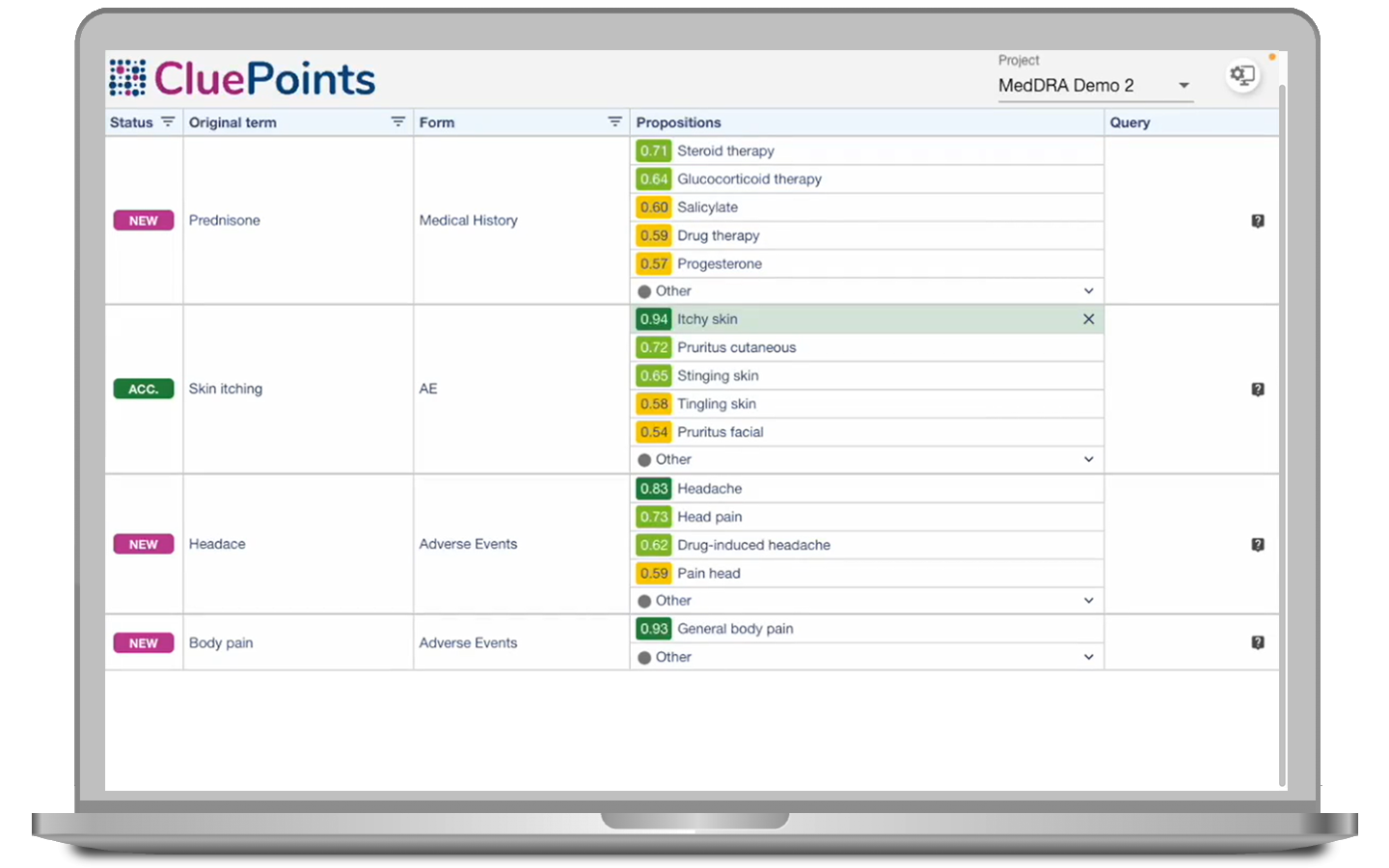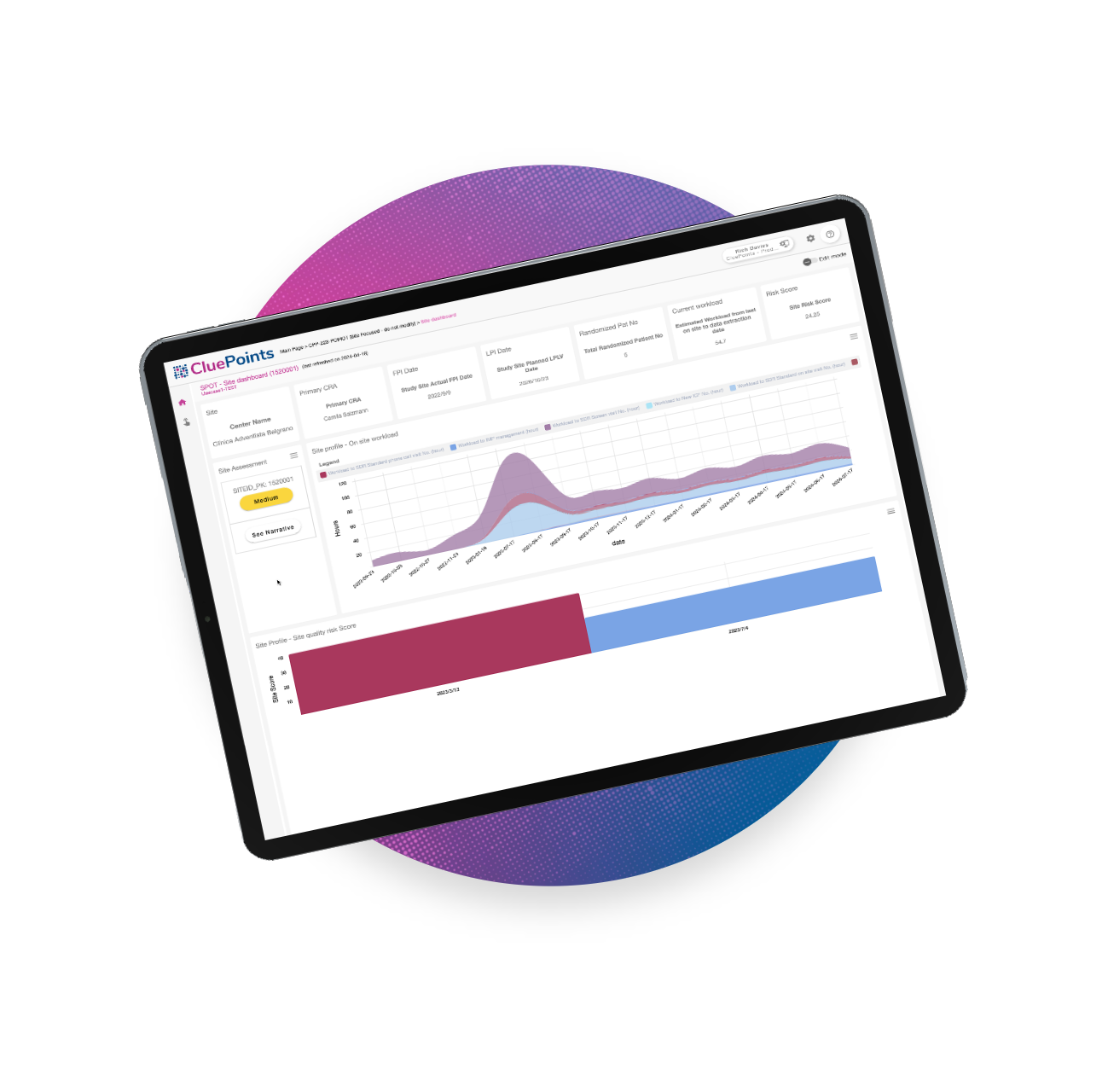Intelligent Medical Coding
With 20–30% of medical coding terms requiring manual processes, CluePoints strives to cut the coding effort in half. Intelligent Medical Coding harnesses advanced Deep Learning (DL) technology to enhance the accuracy and efficiency of coding in clinical trials. It seamlessly integrates with existing systems to offer precise, AI-generated coding suggestions. This automation dramatically reduces the need for manual dictionary searches and costly coding reviews, freeing up valuable resources and ensuring uniformity across all coded data throughout the clinical trial process.
USERS
DE-RISKED
ISSUES DETECTED
Automated Coding Processes
Traditional coding systems use synonym lists to help match terms from medical records to standardized medical codes. However, not all terms can be matched automatically. Medical coders spend considerable time assigning codes, typically with 85% accuracy on initial review. These are subject to secondary review, in which an approver accepts or rejects decisions, adding a layer of scrutiny and quality control before finalizing the medical code. Our DL model supports the manual coding process by providing suggestions for codes at up to 99% accuracy.

Continuous Improvement with AI-Driven Deep Learning
Our DL model leverages insights from automated medical coding and the decisions of medical coders to continuously maintain and improve the suggestions sent for each verbatim. This advancement transforms coders’ roles from essential data management to more analytical data science tasks. Coders now focus more on approving, reviewing, and analyzing coding trends, which adds value by enabling deeper insights into clinical trial data.

Quality Control Checks
Manual quality control checks in medical coding often result in inconsistencies due to human error, varying interpretations, and the sheer volume of data to be reviewed. These checks are time-consuming and prone to error, leading to potential inaccuracies in the coding process as well as additional time and cost for review. Our system enables risk-based quality control of medical codes, ensuring accurate coding with limited manual intervention. Through continuous learning and adaptation, our DL model minimizes errors and discrepancies, providing reliable results with unmatched consistency.

Medical Coding System Implementation Support
CluePoints supports the implementation of our medical coding solution in ongoing clinical trials. Our professional services team is available to guide your journey every step of the way.

Deep Learning Model
Unlock unparalleled accuracy and efficiency with advanced capabilities for automated medical coding.
High-Probability Medical Code Suggestions
Our Deep Learning (DL) model provides automated medical coding suggestions for adverse events and concomitant medications at up to 99% accuracy, streamlining manual coding.
Streamlined Medical Coding Processes
Significantly reduce the time and effort spent manually coding terms while also increasing coding consistency.
Improved Data Quality Control
Minimize manual quality control checks, reducing inconsistencies across medical coders and studies while saving time and resources.
Dictionary Upversioning
Our DL model can automatically handle regular upgrades of the WHODrug and MedDRA dictionaries, with up to 80% accuracy for completely new terms.
Broad Vocabulary Support
Ensure accurate and automated medical coding across a broad spectrum of medical jargon, drug names, and emerging clinical trial terminology.
Semantic Understanding
The DL model understands the meaning of medical terms, even for nuanced terms such as translating “ache” to “pain” effectively.
Explore Our Knowledge Center
Intelligent Medical Coding for Every Clinical Trial
CluePoints provides Sponsors and CROs with a smarter way to detect and manage risks that could impact clinical trial outcomes. By leveraging the potential of AI and advanced statistics, CluePoints is transforming a powerful, best-in-class platform of solutions into positive clinical development outcomes as our partners work to develop innovative therapies to improve the lives of people worldwide.
Contract Research Organizations (CROs)
Pharmaceuticals
A New Era of Automation: Improving Efficiency & Outcomes
In clinical trials, patient data such as adverse events and concomitant medications is coded against standard medical dictionaries. However, this process comes with challenges. A large number of codes require manual review and duplicate work, making the task labor-intensive and highly inefficient. These manual efforts can lead to inconsistencies in coded terms across coders and studies, delays, and increased costs, which ultimately slow down the time to market for clinical trials. Many teams are leveraging AI for higher-quality clinical trials but fail to make the most of AI’s potential when it comes to medical coding.


